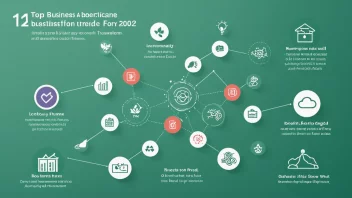In this article, readers will explore the significant impact startups have on the modern economy. We will discuss their contributions to innovation, job creation, and economic growth, providing a step-by-step guide on understanding their role and how they can be effectively leveraged for economic advancement.
Step 1: Understanding Startups
Startups are typically defined as newly established businesses, often focusing on developing a unique product or service. They operate in various sectors, aiming to solve specific problems or meet emerging needs. Recognizing the essence of startups is crucial for appreciating their role in the economy.
Step 2: Exploring Innovation
Startups are often at the forefront of innovation. They challenge established companies by introducing new technologies and disruptive business models. To understand their impact:
- Identify key areas where startups have driven innovation, such as technology, healthcare, and sustainability.
- Examine case studies of successful startups that have transformed their industries.
- Follow trends in venture capital funding to see where the most promising innovations are being invested in.
Step 3: Job Creation
One of the most significant contributions of startups is job creation. According to various studies, startups create a large percentage of new jobs in the economy. To explore this:
- Research statistics on job creation by startups versus established companies.
- Explore how startups contribute to workforce diversity and inclusion.
- Identify support systems like incubators and accelerators that help startups scale and hire.
Step 4: Economic Growth and Contribution
Startups play a vital role in economic growth by contributing to GDP and fostering competition. To analyze this contribution:
- Look at data comparing the GDP contributions of startups versus traditional businesses.
- Investigate how startups stimulate local economies through spending and investment.
- Examine the role of startups in driving competition, which can lead to lower prices and better products for consumers.
Step 5: Navigating Challenges
While startups are crucial for economic dynamism, they also face numerous challenges such as funding, market entry, and regulatory hurdles. Understanding these challenges is essential:
- Identify common barriers faced by startups in securing funding.
- Research the impact of government regulations on startup growth.
- Explore resources available to help startups overcome these challenges, such as mentorship programs and networking opportunities.
Step 6: Future Trends and Predictions
As we look to the future, it's important to understand emerging trends that may shape the startup landscape:
- Identify sectors expected to see significant startup growth, like renewable energy and artificial intelligence.
- Examine how global events, such as pandemics or economic recessions, can influence startup emergence.
- Consider the impact of technology on startup operations, including remote work and digital marketing strategies.
In conclusion, startups are not just small businesses; they are key drivers of innovation, job creation, and economic growth. By understanding their role, the challenges they face, and the future trends affecting them, we can better appreciate their significance in today’s economy. As you explore the startup landscape, keep an eye on emerging trends and consider how these dynamic entities can be harnessed for economic advancement.






